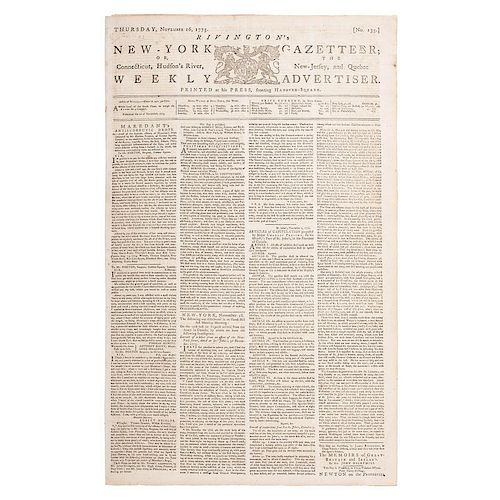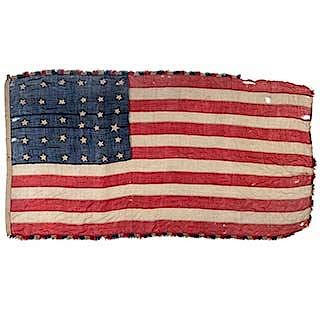Rare Revolutionary War Newspaper, Rivington's New-York Gazetteer; or, the Connecticut, Hudon's River, New-Jersey, and Quebec
About Seller
6270 Este Ave.
Cincinnati , OH 45232
United States
With offices in Cincinnati, Cleveland and Denver, Cowan’s holds over 40 auctions each year, with annual sales exceeding $16M. We reach buyers around the globe, and take pride in our reputation for integrity, customer service and great results. A full-service house, Cowan’s Auctions specializes in Am...Read more
Two ways to bid:
- Leave a max absentee bid and the platform will bid on your behalf up to your maximum bid during the live auction.
- Bid live during the auction and your bids will be submitted real-time to the auctioneer.
Bid Increments
| Price | Bid Increment |
|---|---|
| $0 | $25 |
| $500 | $50 |
| $1,000 | $100 |
| $2,000 | $250 |
| $5,000 | $500 |
| $10,000 | $1,000 |
| $20,000 | $2,500 |
| $50,000 | $5,000 |
| $100,000 | $10,000 |
About Auction
Nov 17, 2017 - Nov 18, 2017
Cowan's Auctions dawnie@cowans.com
- Lot Description
Rivington's New-York Gazetteer; or, the Connecticut, Hudson's River, New-Jersey, and Quebec Weekly Advertiser. Hanover-Square, NY: James Rivington, November 16, 1775. No. 135. 4pp. 11.25 x 18.25 in.
This is an exquisitely rare Revolutionary War newspaper title in and of itself. In addition, this issue contains front page headlines and a long detailed first report of the capture of Fort St. Jean in Quebec by American military forces, an inside page Proclamation signed in type by John Hancock in his position as President of the Continental Congress, and two slave sale ads.
The Siege of Fort St. Jean (also known as St. John or St. John's) was conducted from September 17 until November 3, 1775. American forces led by Brigadier General Richard Montgomery attacked the town and fort of St. Jean in the British province of Quebec. The Continental Army successfully established a siege around the fort, but only after a number of failed attempts early on in September. Disease, weather, and logistics proved to be difficulties in the offensive; however, the Continental forces were able to penetrate the fort and eventually bring its defenders to surrender. Defenses persisted for a while due to their belief that General Guy Carleton would come to their aid, but when that attempt was thwarted and the Americans opened fire yet again, Major Charles Preston capitulated, giving up the fort on November 3, 1775. With Fort St. Jean out of the way, the American army was able to move on to Montreal, which fell quickly and without battle only ten days later.
The proclamation signed by John Hancock and dated November 4, 1775 comes after a discussion of the House of Representatives about the Quaker presence in the colonies. The proclamation reads, "The Congress considering that the most perfect union between all the colonies is essentially necessary for the preservation of the just rights of North-America, and being apprehensive that there is great danger of hostilities being commenced at or near Wyoming, between the inhabitants of Pennsylvania and those of Connecticut, Resolved, That the Assemblies of the said colonies be requested to take the most speedy and effectual steps to prevent such hostilities..."
A slave sale ad on page 3 reads, "For Sale. A Negro Fellow, 31 years old, an excellent Servant for a country Gentleman that would give him employ in the Farming way; has no fault, except a too great fondness for a particular Wench, in his old neighbourhood. Enquire of the Printer."
Condition consistent with age of item, some brittleness/tearing at edges. Repaired crease.Condition
Eliminate the Hassle of Third-Party Shippers: Let Cowan's Ship Directly To You!
If you'd like a shipping estimate before the auction, contact Cowan's in-house shipping department at shipping@cowans.com or 513.871.1670 x219. - Shipping Info
-
Eliminate the Hassle of Third-Party Shippers: Let Cowan's Ship Directly To You!
If you'd like a shipping estimate before the auction, contact Cowan's in-house shipping department at shipping@cowans.com or 513.871.1670 x219.
At the request of the buyer, Cowan's will authorize the shipment of purchased items. Shipments usually occur within two weeks after payment has been received. Shipment is generally made via UPS Ground service. Unless buyer gives special instructions, the shipping method shall be at the sole discretion of Cowan's Auctions, Inc.. Cowan's is in no way responsible for the acts or omissions of independent handlers, packers or shippers of purchased items or for any loss, damage or delay from the packing or shipping of any property.
-
- Buyer's Premium



 EUR
EUR CAD
CAD AUD
AUD GBP
GBP MXN
MXN HKD
HKD CNY
CNY MYR
MYR SEK
SEK SGD
SGD CHF
CHF THB
THB














